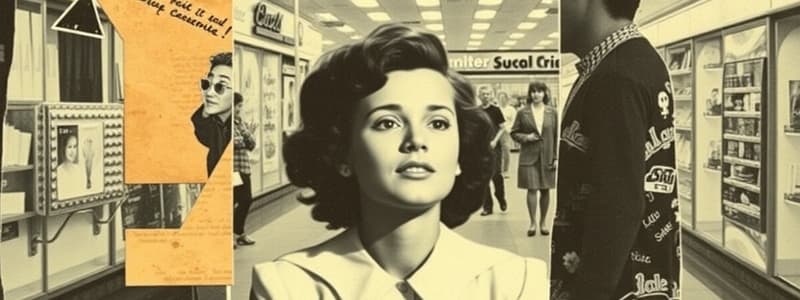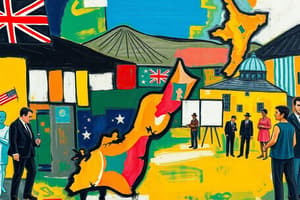Podcast
Questions and Answers
What social phenomenon was encouraged by the availability of loans to veterans and affordable housing?
What social phenomenon was encouraged by the availability of loans to veterans and affordable housing?
- Urban renewal
- Suburban decay
- Civil rights movement
- White flight (correct)
What nickname was given to the generation born between 1946 and 1964 due to the significant rise in birthrate?
What nickname was given to the generation born between 1946 and 1964 due to the significant rise in birthrate?
- Generation X
- The Silent Generation
- Millennials
- Baby boomers (correct)
How did the emergence of consumerism in the 1950s primarily impact American family life?
How did the emergence of consumerism in the 1950s primarily impact American family life?
- Increased focus on savings
- Decrease in household purchases
- More disposable income and spending (correct)
- Reduction in advertising
Which type of music emerged in the 1950s and was particularly popular among teenagers?
Which type of music emerged in the 1950s and was particularly popular among teenagers?
How did teenagers in the 1950s typically view authority compared to their parents?
How did teenagers in the 1950s typically view authority compared to their parents?
What was one of the main goals of Stalin regarding East Germany?
What was one of the main goals of Stalin regarding East Germany?
Which country administered one zone of Germany post-WWII?
Which country administered one zone of Germany post-WWII?
What financial aid program did the United States establish to help Western Europe after WWII?
What financial aid program did the United States establish to help Western Europe after WWII?
What was one consequence of the Marshall Plan in West Germany?
What was one consequence of the Marshall Plan in West Germany?
What did the Berlin Airlift aim to achieve?
What did the Berlin Airlift aim to achieve?
Which organization was formed in 1949 as a response to the geopolitical climate at the time?
Which organization was formed in 1949 as a response to the geopolitical climate at the time?
What policy did the Truman Doctrine implement?
What policy did the Truman Doctrine implement?
What reaction did Stalin have to West Germany's recovery under Western powers?
What reaction did Stalin have to West Germany's recovery under Western powers?
What was a primary purpose of the Warsaw Pact?
What was a primary purpose of the Warsaw Pact?
What term did Eisenhower use to describe the policy of being willing to go to the brink of war?
What term did Eisenhower use to describe the policy of being willing to go to the brink of war?
What was the significance of Emmett Till's murder?
What was the significance of Emmett Till's murder?
What was the outcome of the Montgomery Bus Boycott?
What was the outcome of the Montgomery Bus Boycott?
What did the Civil Rights Act of 1957 aim to eliminate?
What did the Civil Rights Act of 1957 aim to eliminate?
During the Little Rock Nine crisis, what action did President Eisenhower take?
During the Little Rock Nine crisis, what action did President Eisenhower take?
What was Ruby Bridges known for during her time in school?
What was Ruby Bridges known for during her time in school?
Which program provided various benefits to soldiers returning from World War II?
Which program provided various benefits to soldiers returning from World War II?
What was redlining in the context of banking practices?
What was redlining in the context of banking practices?
How did the GI Bill contribute to suburban growth in the U.S.?
How did the GI Bill contribute to suburban growth in the U.S.?
What did Sputnik 1 represent when launched by the Soviet Union?
What did Sputnik 1 represent when launched by the Soviet Union?
What major influence did McCarthyism have on society during the 1950s?
What major influence did McCarthyism have on society during the 1950s?
Flashcards are hidden until you start studying
Study Notes
Division of Germany
- Germany divided into four zones: UK, France, and US administer three; Russia administers one.
- Joint decisions aimed at future reunification, with promises of free elections, press, and speech.
- Germany to pay reparations primarily to Russia.
Administration of East and West Germany
- East Germany under Russian control, intentionally kept weak to prevent military buildup and strip resources to benefit Russia.
- West Germany received favorable treatment from US, UK, and France, focusing on economic recovery to avoid mistakes of Versailles.
US Foreign Policy Initiatives
- Truman Doctrine established in 1947 to contain communist expansion in Europe.
- Marshall Plan provided $12.5 billion in financial aid to rebuild Western Europe, strengthening ties with the US.
Economic Recovery of West Germany
- Introduction of the Deutschmark revitalized the economy, facilitating travel between Berlin sectors.
- East Berlin's educated population migrated to West Berlin, attracted by better living conditions.
Berlin Blockade and Response
- Stalin blocked all ground access to West Berlin to halt its progress; led to the Berlin Airlift (June 1948 - September 1949) by Allies to supply West Berliners.
NATO and Warsaw Pact
- NATO formed in 1949 as a mutual defense alliance among US, Canada, and Western Europe.
- In response, Soviet Union created the Warsaw Pact in 1955, including Eastern European countries and East Germany.
Eisenhower's Brinkmanship
- Eisenhower adopted a "brinkmanship" policy, ready to confront the Soviet Union at any time.
- Significant increases in US defense spending alongside the development of nuclear weapons, including a new hydrogen bomb.
McCarthyism and Cold War Fears
- McCarthyism characterized by inflated fears of communism, leading to widespread paranoia known as the "Red Scare."
Space Race
- 1957, Soviet Union launched Sputnik 1, the first artificial satellite, prompting US to enhance its space program and pass the National Aeronautics and Space Act.
Civil Rights Movement Events
- Emmett Till's murder in 1955 highlighted racial injustice; suspects acquitted, showcasing systemic failures of the Southern legal system.
- Claudette Colvin and Rosa Parks defied segregation laws, igniting a significant bus boycott in Montgomery lasting 381 days, ultimately leading to bus desegregation.
Legislative Changes
- Civil Rights Act of 1957 aimed to eliminate voting discrimination, ending literacy tests and poll taxes.
- The Southern Christian Leadership Conference (SCLC) promoted nonviolent resistance within the Civil Rights movement.
Little Rock Nine
- In 1957, the integration of 9 black students into Little Rock Central High School faced violent opposition; President Eisenhower intervened to ensure their safety.
Ruby Bridges
- In New Orleans, young Ruby Bridges faced significant adversity while integrating her school, highlighting the struggle for civil rights and education.
G.I. Bill and Economic Impact
- G.I. Bill (Servicemen’s Readjustment Act) provided veterans with low-interest loans, unemployment benefits, and education funding, significantly impacting post-war society.
- Suburban growth accelerated post-war due to the G.I. Bill, with Levittown as a prime example of mass housing development, fueling "white flight."
Social Changes and Consumerism
- Birthrate surged from 1946 to 1964, giving rise to the "baby boomer" generation.
- 1950s saw an emphasis on social conformity, increased consumerism, and widespread television ownership.
- Rock and Roll emerged as a teenage cultural phenomenon, generating both enthusiasm and resistance from older generations.
Origin and Concept
- Levittown was created by Levitt & Sons, established by William Levitt.
- The inaugural community was launched in 1947 in Long Island, New York.
- Aimed to offer affordable housing options for returning World War II veterans.
Mass Production Techniques
- Utilized assembly line methods for efficient construction.
- Standardized house designs facilitated quick building and cost reduction.
- Homes were uniform in layout, with limited design variations.
Characteristics of Levittown Homes
- Featured basic, single-family residences, primarily one story.
- Average home size was approximately 1,000 square feet.
- Typically included 2-3 bedrooms, a living area, kitchen, and bathroom.
Affordability and Accessibility
- Homes sold for roughly 8,000inthelate1940s,equivalenttoabout8,000 in the late 1940s, equivalent to about 8,000inthelate1940s,equivalenttoabout90,000 today.
- Accessible financing options enabled middle-class families to purchase homes.
- Attractive low down payments and favorable mortgage terms promoted homeownership.
Community Planning
- Developed parks, schools, and shopping districts to enhance community feel.
- Designed with family needs in mind, supporting a suburban lifestyle.
Impact on Society
- Became emblematic of post-war prosperity and the American Dream narrative.
- Played a pivotal role in the expansion of suburbia throughout the United States.
- Impacted housing policies and urban planning strategies nationwide.
Criticism and Challenges
- Faced accusations of sustaining racial segregation through biased practices.
- Policies largely favored white families, resulting in limited diversity.
- Rapid suburban growth raised environmental issues and concerns.
Legacy
- Established a framework for future suburban developments across the U.S.
- Serves as a crucial example in urban planning, housing policy, and social dynamics.
- Continues to be a reference point in discussions regarding suburbanization and community identity.
Studying That Suits You
Use AI to generate personalized quizzes and flashcards to suit your learning preferences.



